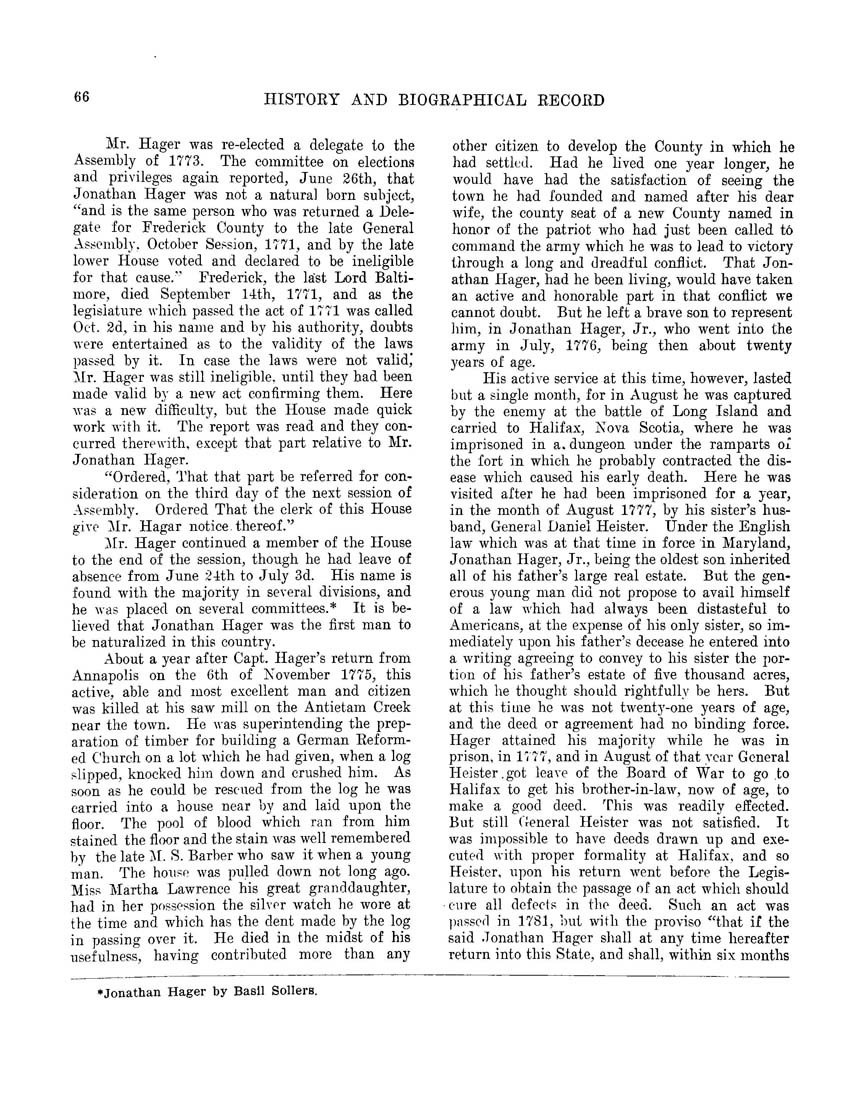66
HISTORY AND BIOGRAPHICAL RECORD
Mr. Hager was re-elected a delegate to the
Assembly of 1773. The committee on elections
and privileges again reported, June 26th, that
Jonathan Hager "n'as not a natural born subject,
"and is the same person who was returned a Dele¬
gate for Frederick County to the late General
Assembly. October Session, 1771, and by the late
loyver House voted and declared to be ineligible
for that cause." Frederick, the last Lord Balti¬
more, died September 14th, 1771, and as the
legislature which passed the act of 1771 was called
Oct. 2d, in his name and by his authority, doubts
were entertained as to the validity of the laws
passed by it. In case the laws were not valid,'
Mr. Hager was still ineligible, until they had been
made valid by a new act confirming them. Here
was a new difficulty, but the House made quick
work with it. The report was read and they con¬
curred therewith, except that part relative to Mr.
Jonathan Hager.
"Ordered, That that part be referred for con¬
sideration on the third day of the next session of
Assembly. Ordered That the clerk of this House
give Mr. Hagar notice.thereof."
ilr. Hager continued a member of the House
to the end of the session, though he had leave of
absence from June 24th to July 3d. His name is
found with the majority in several divisions, and
he was placed on several committees.* It is be¬
lieved that Jonathan Hager was the first man to
be naturalized in this country.
About a year after Capt. Hager's return from
Annapolis on the 6th of November 1775, this
active, able and most excellent man and citizen
was killed at his saw mill on the Antietam Creek
near the town. He was superintending the prep¬
aration of timber for building a German Reform¬
ed Church on a lot which he had given, when a log
slipped, knocked him down and crushed him. As
soon as he could be rescued from the log he was
carried into a house near by and laid upon the
floor. The pool of blood which ran from him
stained the floor and the stain was well remembered
by the late II. S. Barber who saw it when a young
man. The house was pulled down not long ago.
Miss Martha Lawrence his great granddaughter,
had in her possession the silver watch he wore at
the time and which has the dent made by the log
in passing over it. He died in the midst of his
usefulness, having contributed more than any
other citizen to develop the County in which he
had settled. Had he lived one year longer, he
would have had the satisfaction of seeing the
town he had founded and named after his dear
wife, the county seat of a new County named in
honor of the patriot who had just been called to
command the army which he was to lead to victory
through a long and dreadful conflict. That Jon¬
athan Hager, had he been living, would have taken
an active and honorable part in that conflict we
cannot doubt. But he left a brave son to represent
him, in Jonathan Hager, Jr., who went into the
army in July, 1776, being then about twenty
years of age.
His active service at this time, however, lasted
but a single month, for in August he was captured
by the enemy at the battle of Long Island and
carried to Halifax, Nova Scotia, where he was
imprisoned in a. dungeon under the ramparts of
the fort in which he probably contracted the dis¬
ease which caused his early death. Here he was
visited after he had been imprisoned for a year,
in the month of August 1777, by his sister's hus¬
band. General Daniel Heister. Under the English
law- which was at that time in force in Maryland,
Jonathan Hager, Jr., being the oldest son inherit-ed
all of his father's large real estate. But the gen¬
erous young man did not propose to avail himself
of a law which had always been distasteful to
Americans, at the expense of his only sister, so im¬
mediately upon his father's decease he entered into
a yvriting agreeing to convey to his sister the por¬
tion of his father's estate of five thousand acres,
which he thought should rightfully be hers. But
at this time he was not twenty-one years of age,
and the deed or agreement had no binding force.
Hager attained his majority yvhile he was in
prison, in 1777, and in August of that 3'car General
Heister. got leave of the Board of War to go .to
Halifax to get his brother-in-law, now of age, to
make a good deed. This was readily effected.
But still General Heister was not satisfied. It
was impossible to have deeds drawn up and exe¬
cuted with proper formality at Halifax, and so
Heister, upon his return went before the Legis¬
lature to obtain the passage of an act which should
cure all defects in the deed. Such an act was
jiassed in 1781, 'out "with the proviso "that if the
said Jonathan Hager shall at any time hereafter
return into this State, and shall, within six inonths
♦Jonathan Hager by Basil Sellers.
|








